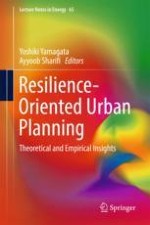2018 | OriginalPaper | Buchkapitel
11. Is Connectivity a Desirable Property in Urban Resilience Assessments?
verfasst von : Marta Olazabal, Lorenzo Chelleri, Ayyoob Sharifi
Erschienen in: Resilience-Oriented Urban Planning
Aktivieren Sie unsere intelligente Suche, um passende Fachinhalte oder Patente zu finden.
Wählen Sie Textabschnitte aus um mit Künstlicher Intelligenz passenden Patente zu finden. powered by
Markieren Sie Textabschnitte, um KI-gestützt weitere passende Inhalte zu finden. powered by
